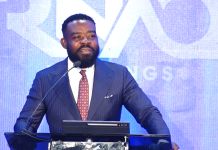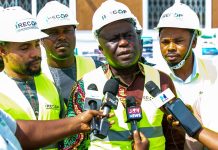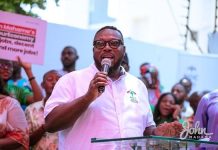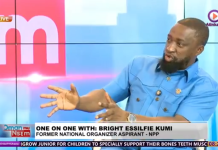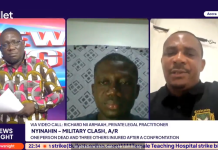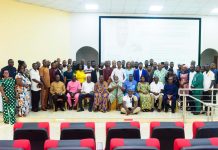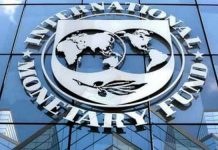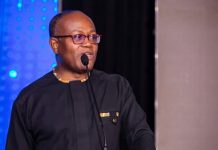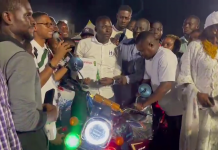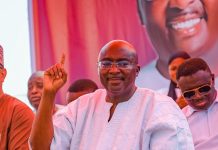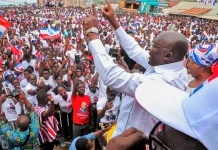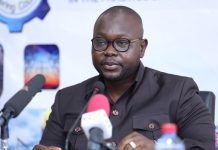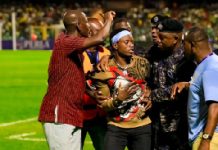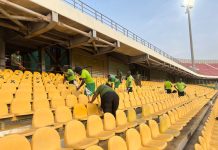The National Elections Security Task Force (NESTF) led by the Inspector-General of Police (IGP), Dr. George Akuffo Dampare, has commended the Electoral Commission (EC), political parties, and all Ghanaians for their peaceful conduct in preparations for the 2024 December 7 Elections.
During a meeting between the Task Force and the Commission at the EC Head Office in Accra on Tuesday, 26th November 2024, the IGP stated that the commendation reflects the security perspective on how all stakeholders have contributed to creating a conducive security atmosphere, surpassing previous electoral processes.
At a meeting with political parties and their leaders at the Police Headquarters in Accra last week, IGP Dr. George Akuffo Dampare, invited all present, especially members of the National Election Security Task Force, to rise and applaud the political parties and their leaders for their conduct during the campaign period, noting the absence of security breaches or violence, which had previously been the norm.
This level of appreciation and commendation was reechoed to the Electoral Commission, political parties, and the generality of Ghanaians for their exemplary conduct in ensuring that the processes leading to the election have been remarkably peaceful so far.
The Inspector-General of Police indicated that all stakeholders have played their part in trying to walk the talk of peace. He appealed that these efforts are doubled by ensuring that each stakeholder plays their part within the law in a transparent, fair and firm manner so that their actions which are in conformity with the law will be multiple times louder than their words.
He further indicated that the National Election Security Task Force is prepared for the task ahead and urged the EC and its staff to continue to undertake their constitutional mandate, while assuring them of the necessary protection.
He also encouraged the political parties, their leaders, and members to fulfill their roles within the law as required, reaffirming the Task Force’s commitment to their protection.
The IGP additionally urged the generality of Ghanaians to feel free to carry out their activities within the law, assuring them of the Task Force’s readiness to ensure their safety during the elections and beyond.
Dr. George Akuffo Dampare assured the EC, political parties, and all Ghanaians that the National Elections Security Task Force will collaborate with all stakeholders to make this year’s election the most peaceful in Ghana’s history.
In attendance at the meeting were the heads of other security services, including the Chief of Army Staff, Major General Bismarck Kwasi Onwona, representing the Chief of Defence Staff (CDS); the Director General of Prisons, Mr. Isaac Kofi Egyir; the Chief Fire Officer, Mr. Julius Kuunuor; the Comptroller-General of the Ghana Immigration Service, Mr. Kwame Asuah Takyi; the Commissioner of Customs, Brigadier General Zibrim Bawah Ayorrogo; and members of the Technical Committees of the Task Force.
Journalists must uphold professionalism despite political affiliations – GJA President
The President of the Ghana Journalists Association (GJA), Albert Kwabena Dwumfour, has expressed concern over the growing unprofessionalism among journalists due to their political affiliations.
During an interview with Kemenni Amanor on TV3’s Hot Issues, Albert Dwumfour highlighted that political bias among journalists is a significant challenge undermining the profession.
“The political affiliation of independent journalists is one major problem affecting professionalism. Even if you are politically inclined, just make sure you are professional,” he advised.
Mr. Dwumfour acknowledged, however, that some journalists, despite publicly declaring their political stance, have managed to uphold professional standards.
He described journalism as a vocation and a “ministry” that must be practised with integrity and professionalism.
He urged journalists to approach their responsibilities with emotional intelligence and impartiality, especially during elections.
“Journalists must be emotionally intelligent and discharge their duties dispassionately in the coverage of elections.
“They need to control themselves, maintain composure, and remember that they are the eyes, ears, and voice of the people,” he emphasised.
High cost of political campaigning discouraging women -GII, GACC
Story: Prosper K.S. Agbitor
The Ghana Anti-Corruption Coalition, a civil society organization dedicated to reducing corruption in Ghana, is projecting a further reduction in female representation in the country.
According to the Executive Secretary of the Ghana Anti-Corruption Coalition (GACC), Beauty Emefa, the high cost of political campaigning in the country has caused females to lose interest in the political process.
According to studies, it takes approximately $1 million to fully participate in the electioneering process and become a member of Parliament, a sum that African women often struggle to secure.
According to Beauty Emefa Nartey, this situation is concerning, particularly for women who have previously shown potential as leaders, as the significant costs associated with campaigning continue to reduce their ability to effectively represent their constituents.
At the Ghana Anti-Corruption Coalition (GACC) forum, Ghana Integrity Initiative (GII), Centre for Democratic Governance (CDD),
Beauty Emefa Nartey, among others, discussed the abuse of incumbency, campaign financing, vote buying, and corruption in election processes. She also pointed out that the two main political parties, NDC and NPP, are fielding 20 female parliamentary candidates. However, some of these candidates are in a fiercely competitive race with male candidates, potentially losing to their male counterparts due to the unique dynamics of the contested area.
“Women who are qualified to lead in the governance process are being denied because they are not able to afford the high cost of political funding,” she said.
However, she urged political parties in Ghana to allocate more funds to female candidates while reducing the high cost of funding to ensure a fair process.
Executive Director for Ghana Integrity Initiative (GII), Mary Adah, added her voice and noted that the current system, which requires significant financial resources for filling and campaigning, makes it difficult for women to obtain the necessary resources to participate in political representation.
She says these challenges will whittle down female representation in the next Parliament in 2025.
However, she calls on Ghanaians to show interest in funding politicians and challenges actors to disclose their source of funding to help reduce corruption.
Mary Adah said one medium through which the political funders get their money after winning the election is at times through soul-sourced contracts, thereby depriving the country of development.
I am a senior program manager who oversees human rights and social inclusion at the Centre for Democratic Development.
However, Augustus Akakpo urged the Ghanaian electorate to understand that if they demand money from politicians to vote for them, they will ultimately fight against them.
He stated, “The underdevelopment we observe in our country is a result of the seeds of corruption that have been sown and are affecting them.”
He observed that if Ghanaians want to show their maturity, they should not allow financial influences to be a reason to vote for a particular political party.
Ghana | Atinkaonline.com


